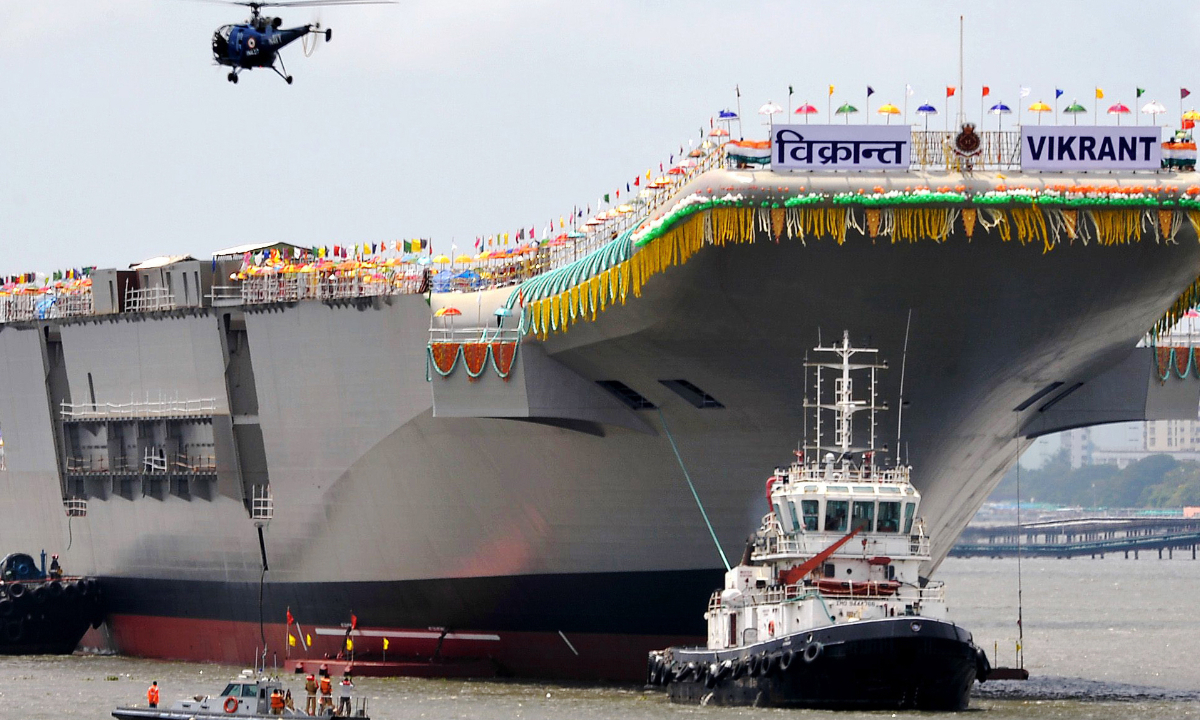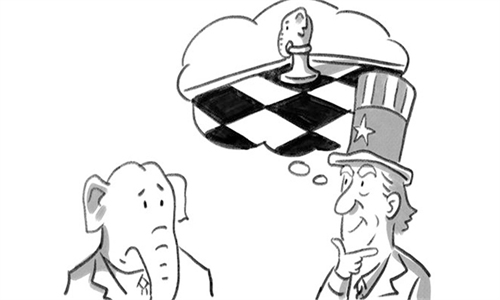Be wary of Western flattery to turn the commissioning of India’s aircraft carrier into a military event against China

A tugboat guides the indigenously built aircraft carrier INS Vikrant as it leaves the shipyard after the launch ceremony in Kochi. Photo:AFP
The commissioning of India's first home-built aircraft carrier on Friday received pretty much flattery from the Western media. A CNN report claimed the aircraft carrier has put India into "an elite league of the world's naval powers," and an AFP article hailed it as "a milestone in government efforts to counter China's growing military assertiveness in the region."Their intention couldn't be any clearer: By shaping "China's much larger and growing fleet" as the major target of India's first home-built aircraft carrier, they want to instigate tension and even confrontation between China and India, creating public opinion pressure to push India into an anti-China forefront. It's particularly important for India to stay sober amid Western flattery that is aimed at luring India into an anti-China cannon fodder.
It indeed was a moment for India to celebrate its progress in indigenous shipbuilding capabilities. Building The INS Vikrant, whose name is the Sanskrit word for "powerful" or "courageous," hasn't been easy for India. It took 13 years to commission the indigenous aircraft carrier since the keel-laying of it was done in 2009. The carrier has filled the nation with "new confidence," Prime Minister Narendra Modi said at Friday's ceremony marked by fanfare at the Cochin Shipyard in India's southern Kerala state, declaring India has taken one more step toward becoming a developed nation.
But was the West really happy for India? Modi also unfurled the country's new naval flag without a British colonial symbol left over from India's colonial era on the commissioning ceremony, a milestone in India's de-Western colonialism. This, however, was seldom mentioned in most Western reports.
New Delhi needs to guard against the West's attempts to turn the moment into a military event against China. "China has never regarded India as a threat, nor has China taken India as an imaginary rival and target when it develops its own aircraft carriers and navy forces," Lan Jianxue, director of the Department for Asia-Pacific Studies at the China Institute of International Studies, told the Global Times. He noted India's biggest enemy is its own poverty, backwardness and insufficient development as some Indian scholars have acknowledged.
If India falls into the Western public opinion trap to provoke China and regard China as its "main rival" that needs to be contained, it will gain no benefits but only become a cannon fodder, warned Song Zhongping, a Chinese military expert. China is ahead of India in terms of both the number and technology of aircraft carriers and China's carrier localization rate is higher than that of India.
"India's aircraft carrier has a relatively small tonnage, limited combat capabilities and ranges, and certain technologies are still dependent on foreign countries, which has constrained its combat effectiveness and supporting power," said Song.
For an ambitious India that direly needs development, external stability is an important guarantee for domestic development, and maintaining stable relations with major powers is especially important. India needs to keep its strategic sobriety and not to be fooled by the Western flattery. In recent years, the US and the West have increased their efforts to curry favor with India, their real purpose is to fool India to play a bigger role in their Indo-Pacific Strategy to serve their ends. They hope to take advantage of the confrontation between India and China.
A view in the West, and within India as well, holds that China doesn't want to see India's development. This doesn't hold water at all. When it comes to developing relations with India, China has attached great importance to the special significance of "the dragon and elephant dancing together." Aircraft carriers are considered to be one of the most effective strategic tools to safeguard national maritime interests. There is no arms race between China and India, and China will not view India's military progress from a perspective of zero-sum game. It's also hoped that India will not be deceived by the honeyed words of the West.
Both China and India are emerging economies committed to economic and social development. Their common interests far outweigh their differences. China and India should be partners for mutual success instead of adversaries of mutual attrition.
The author is a reporter with the Global Times. opinion@globaltimes.com.cn



